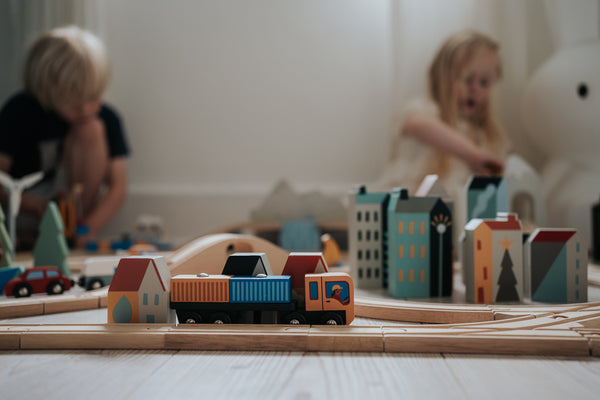The six stages of play

How does your child play?
Does she play alone or with others?
It all depends on her age.
The youngest children play alone. They explore the properties of objects and learn to co-ordinate movements. There's a lot to think about when you are at this stage of development!
But as they move from toddler to preschooler, children's language develops to the point where they can communicate more effectively. And that means they are able to use it in their play.
Let's take a look at the six stages of play and how children learn to co-operate as they grow in age and confidence.
Unoccupied Play
Babies at this stage don't seem to be doing much. They pick up and drop, pile and place. They explore with their senses.
This is developmentally important work but interaction with others is extremely limited.
Solitary Play
At this second stage, your child continues to play alone, but her play is more focused.
She has a plan.
She builds towers or lines up blocks. She pushes cars and trains. This is the beginning of symbolic play.
Onlooker Play
Have you ever seen a child stand alongside another, watching what she is doing but not joining in. This is onlooker play.
At this stage, your child notices other children her but won't necessarily interact with them. She takes an interest in others. At some level, she wants to join in but she's not yet sure how.
Parallel Play
Your child is ready to play alongside others. She stands next to her brother at the train table, pushing a train just like he does, but not communicating. She is dipping a toe in the water, getting ready to socialise.
Associative Play
Very slowly, your child is progressing towards the goal of co-operative play.
She is now interacting with others.
Here is a block. You can have it.
Can I borrow that car?
This is associative play. Your child talks to her playmates but is still pursuing her own goals. You build a tower, she builds a pyramid. You sit side by side and swap pieces. You chat.
She is developing her social skills,
Cooperative Play
This is the final stage - the highest form of play. Your child is working with others towards a common goal.
Let's make a den!
Put that blanket over the chair! It can be Grandma's house. I am Little Red Riding Hood and you are the Big Bad Wolf.
Final word
Learning to play with others is the work of many years but your child will get there in the end. Don't worry that your child isn't ready to share or play with others. She first needs the time to explore materials and concepts by herself. She also has to learn to speak.
Give her time, space and a pressure-free environment. There's a lot of fun to be had along the way.







